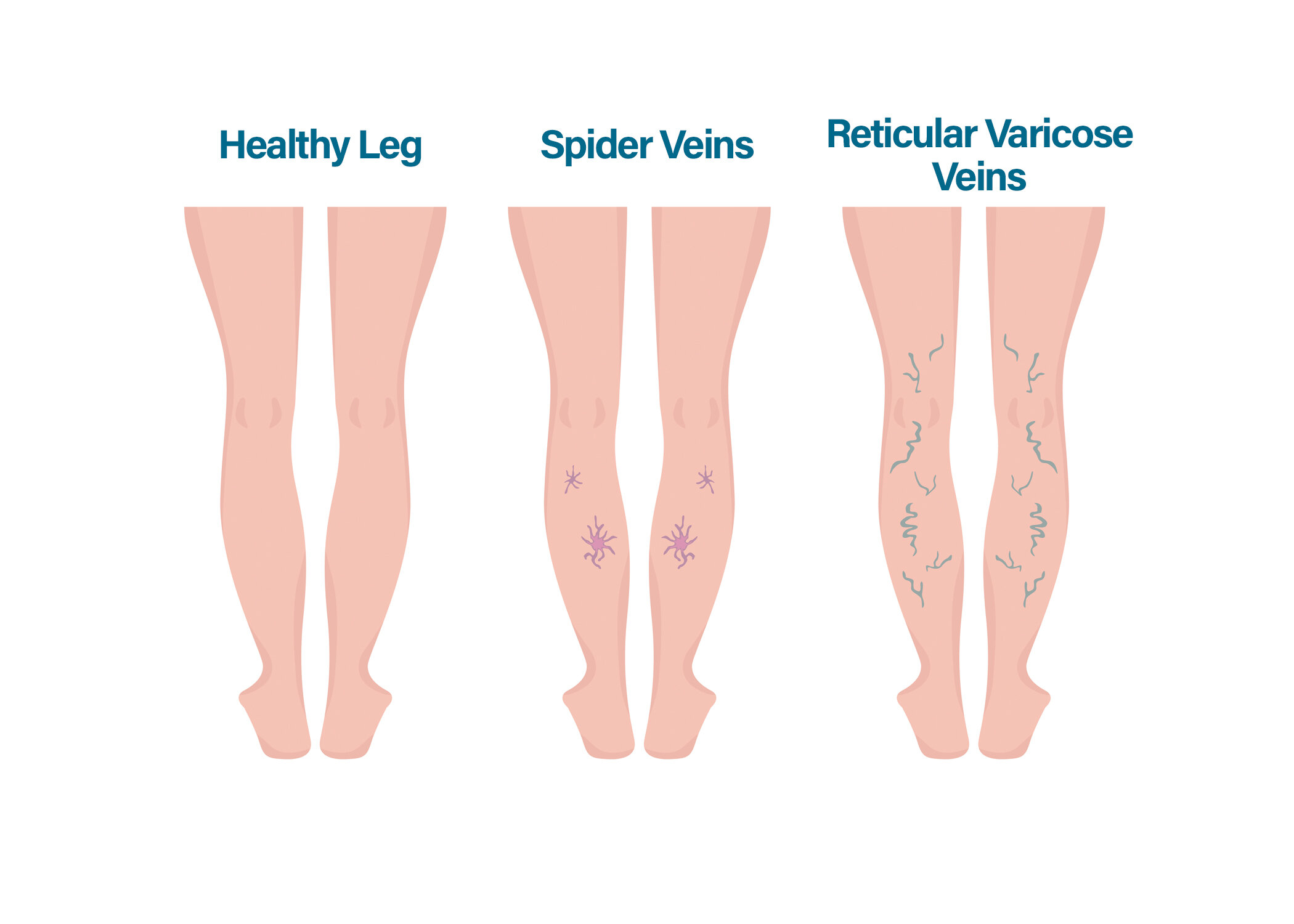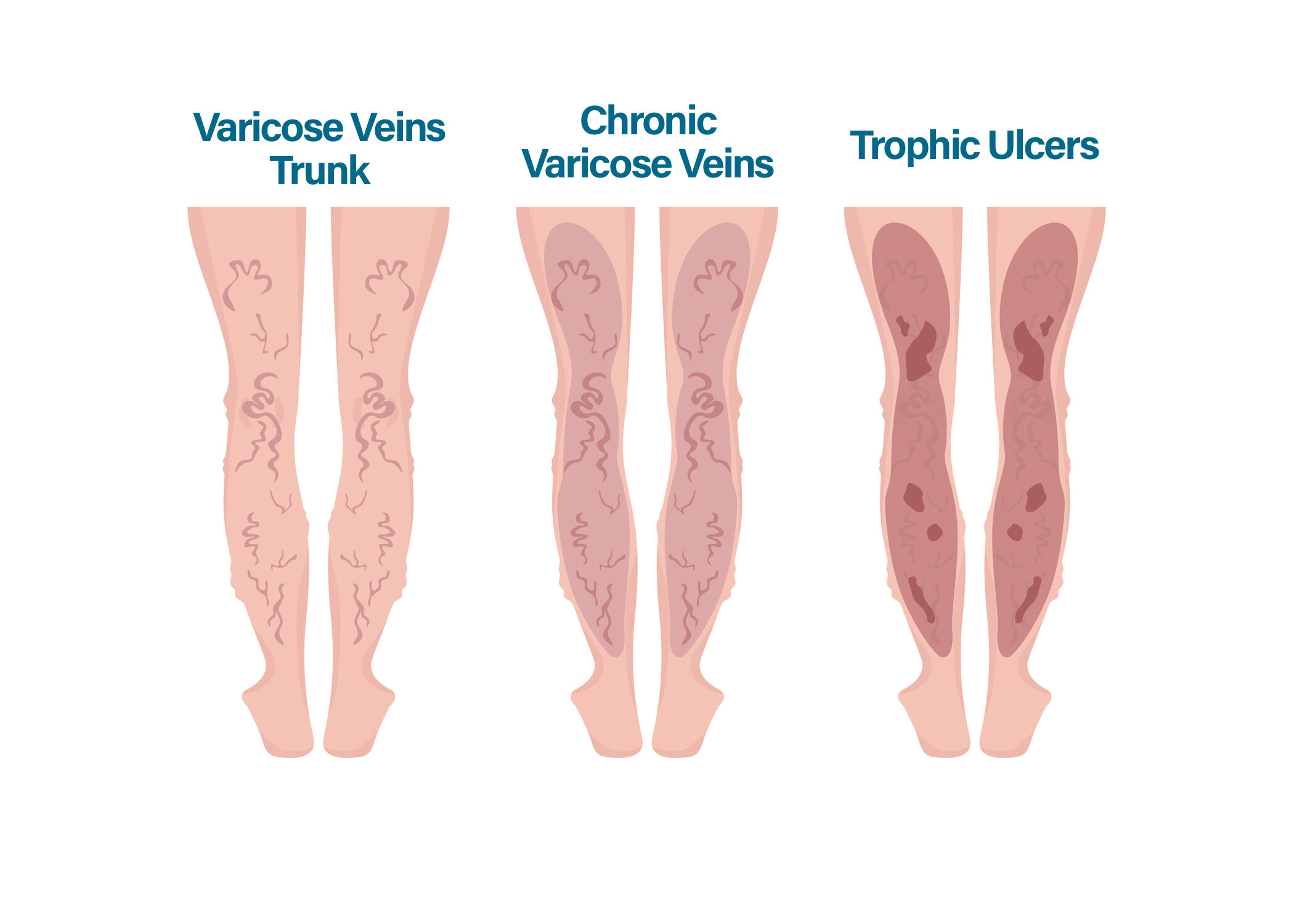Varicose Veins: Symptoms and Treatment Options
What are Varicose Veins?
Varicose veins are caused by the pooling of blood in the veins when valves become weakened or damaged. It's a symptom of chronic venous insufficiency.
This happens most frequently in the legs since blood is forced to travel against gravity, increasing pressure on the veins. Both men and women are susceptible to vein disease because of a genetic factor. One is more likely to suffer from discomfort during pregnancy, or if one has to stand/sit for long periods of time.
Here are visual demonstrations of leg veins:
Causes & Risk Factors
Genetics: If your parents or grandparents have them, you're more likely to suffer from vein disease at some point in your life.
Pregnancy: Most pregnant women develop varicose veins during their pregnancy. There are some preventive care and treatments recommended by our vein doctors here.
Extra body weight: Obesity is a common cause of varicose veins. Extra weight puts pressure on the vein valves and hinders blood flow.
Age: People aged 50+. As people get older, the vein valves weaken, which causes blood to pool and then develop vein problems.
Sitting/Standing for Extended Periods: Being in the same position for a prolonged period puts pressure on the blood vessels.
Varicose Vein Symptoms
Many people are bothered strictly by the appearance of vein problems and associate it with purple or blue, ropey veins which can easily be seen under the skin; however, some veins lie deep beneath the skin’s surface and are invisible to the naked eye. In this case, pay attention to the following symptoms:
Pain
Leg cramps
Discomfort
Swelling
Heaviness
Itching
Skin Discoloration
Complications
While rare, complications can occur, especially with deeper veins. Complications include:
Blood Clots: this complication might develop as a result of persistent leg swelling and leg pain. Deep vein thrombophlebitis is a medical term for this.
Bleeding: the problematic vein might cause some bleeding. As a precaution, any bleeding regardless of the size should be taken care of.
Ulcers: painful ulcers are often found on the lower legs and ankle, near varicose veins areas. These unhealed wounds are not only painful but are also dangerous as they can get infected. Seek your nearest vein doctors immediately before the infection spread to other areas.
If you are dealing with symptoms that are limiting your activity, please talk to a vein specialist at Physicians Vein Clinics for medical advice as we specialize specifically in vein disorders and are here to help you.
Prevention
Though vein disease is not 100% preventable due to the heredity factors, the following procedures can help you to prevent the progression of varicose veins:
Wear compression stockings with a minimum of 20-30mmHg.
Exercise regularly and maintain a healthy weight.
Avoid sitting or standing for long periods. A 5-minute walk once per hour is recommended. Try to point your legs and feet often will also help.
Elevate your legs whenever possible.
Read More: 3 Foods to Prevent Varicose Veins and Vitamins to Vanish Varicose Veins.
Treatment
Varicose veins are more dangerous than spider veins. Without proper treatment, they can worsen. Treatment includes lifestyle changes, non-invasive laser treatment or conservative therapy and medicines.
There is no best-for-all treatment. Depending on your general health and age, physicians will recommend a customized treatment plan, which can be a combination of different procedures. If your vein disease is cosmetic, you might not need any treatment at all. At our veins clinic, we use the most advanced procedures:
Conservative Therapy: most of the time, our vein specialist will start your vein treatment with Conservative Therapy. The treatment is focused more on lifestyle changes. Low-intense exercising, weight control, comfortable clothes, and leg elevations can relieve leg pain and prevent the development of varicose veins. Wearing compression stockings is often also the first approach to treating varicose veins. Compression socks improve leg circulation. The amount of compression depends on your vein conditions and varies by type and brand.
Sclerotherapy: the vein physician injects a solution or foam into the faulty veins. In a few weeks, varicose veins will go away. Sclerotherapy is a minimally invasive treatment that doesn’t require hospital stays. It can be done in your doctor’s office.
Varithena: in this procedure, the vein specialist injects Varithena under the guidance of ultrasound technology into the damaged veins. The foam will expand to collapse and seal the problematic vessels and reroute blood flow to the nearby healthy veins.
Ambulatory Phlebectomy: our physician removes smaller varicose veins through a series of tiny skin punctures. The procedure uses local anesthesia. Downtime is minimal.
Endovenous Laser Ablation: This method uses laser energy to shrink and collapse the damaged veins.
VENCLOSE: This is the most advanced laser treatment for varicose veins. More than 95% of patients are happy with the vein treatment results.
Request a Free Screening
Many people feel self-conscious and uncomfortable living with visible varicose veins. Some people stop wearing shorts and bathing suits and avoid activities like swimming altogether. At Physicians Vein Clinics, we feel that confidence and an active lifestyle contribute to one’s quality of life. We are ready to help reduce or eliminate the appearance of veins through minimally-invasive procedures performed on an outpatient basis.
Frequently Asked Questions
Are varicose veins dangerous?
They can pose a serious medical condition if left untreated. The consequences can include a blood clot, infection, bleeding, ulcers, pain, along with other health issues.
Are varicose vein treatments covered by insurance?
Varicose veins are usually considered vein disease, which is covered by most insurance plans. Book a free screening with us to learn if you are eligible for insurance coverage. If you are not, we offer financing option including GreenSky and CareCredit payments.
Why do varicose veins sometimes appear during pregnancy?
Varicose veins will usually appear in the legs and buttocks during prengancy. The uterus creates pressure on the large veins, which carry blood from the legs to the heart. Though not dangerous, the varicose veins can cause pain and discomfort to pregnant women.
Can varicose veins cause high blood pressure?
Though high blood pressure can cause varicose veins, the reverse remains unknown. Without proper treatment, they can lead to many health issues. Consult with a vein doctor to learn about your overall health risks.


